Saturday, December 30, 2006
Centennial Tributes: Carol Reed
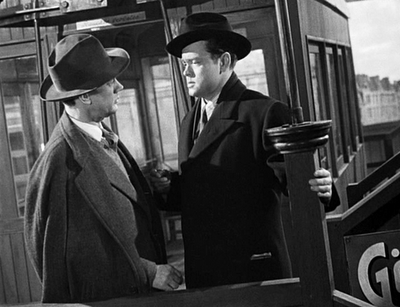
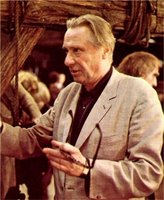
By Edward Copeland
In an introduction on the great Criterion Collection DVD of The Third Man, Peter Bogdanovich speculates that Carol Reed is largely forgotten now because his greatest works came early in his career and were eclipsed by his later, lesser efforts such as Trapeze and The Agony and the Ecstasy and the movie he won the Oscar for, Oliver!, which while fun (sorry Josh R) doesn't come close to equaling his early efforts. I don't necessarily agree — because The Third Man still seems to tower among many movies made today, even if younger viewers are unfamiliar with The Fallen Idol or Odd Man Out. Still if the only movie that Reed, who was born 100 years ago today, ever made had been The Third Man, he would still be deserving of a place among the ranks of film's greatest directors.

Re-watching The Third Man recently, it once again captivated me from the moment the great zither music by Anton Karas begins to play over the credits. With the presence of Orson Welles and Joseph Cotten and great black-and-white cinematography (by Robert Krasker, not Gregg Toland), the movie almost plays as if the gang from Citizen Kane has teamed up
 again. If that weren't enough, it also has a great script by novelist Graham Greene (and Trevor Howard is fun as well). If you haven't seen The Third Man (and shame on you if you call yourself a film buff and you haven't), watching the Criterion DVD really is the way to go, not only for a crisp print but to be able to compare the different versions offered for British and U.S. audiences (though only the different openings are included — we don't see what 17 minutes David O. Selznick cut for American audiences). With its great scenes of Vienna, sly performances and perhaps the greatest entrance of any character in movie history, The Third Man stays near the top of all films ever made, even nearly 60 years after its release.
again. If that weren't enough, it also has a great script by novelist Graham Greene (and Trevor Howard is fun as well). If you haven't seen The Third Man (and shame on you if you call yourself a film buff and you haven't), watching the Criterion DVD really is the way to go, not only for a crisp print but to be able to compare the different versions offered for British and U.S. audiences (though only the different openings are included — we don't see what 17 minutes David O. Selznick cut for American audiences). With its great scenes of Vienna, sly performances and perhaps the greatest entrance of any character in movie history, The Third Man stays near the top of all films ever made, even nearly 60 years after its release.

While The Third Man remains the greatest collaboration between Graham Greene and Carol Reed, it wasn't the first — that came with 1948's The Fallen Idol. Often mischaracterized as a mystery or a thriller, it's a more humanistic tale of what one would do for a friend and when the truth is better than a lie or vice-versa. A charming child actor named Bobby Henrey stars as Phillipe, the son of a French ambassador to England who has developed an deep attachment to the family's butler Baines (a great Ralph Richardson) due to his parents' frequent absences. Baines' kindness toward the child is not equaled by his shrew of a wife, the household's head housekeeper (Sonia Dresdel), who is such an unlikable character she makes Judith Anderson's Mrs. Danvers in Hitchcock's Rebecca look like Mrs. Doubtfire. Baines isn't much fonder of his wife than the boy, keeping a mistress (Michele Morgan) on the side that he hopes to leave her for — not that Mrs. Baines wants to let that happen. When Mrs. Baines dies accidentally, Phillipe is convinced that Baines murdered her and does everything he can to try to protect his friend — only his lies just serve to get the butler deeper in trouble. The Fallen Idol creates quite a different mood than The Third Man or Odd Man Out, but it is still quite good.
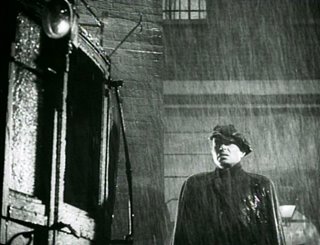
Before The Fallen Idol and The Third Man came another great black-and-white feature from Reed with Odd Man Out in 1947. To think that Reed produced these three films in consecutive years astounds me and is an incredible achievement to this very day. James Mason gave one of his very best performances as Johnny McQueen, an Irish nationalist fighting for freedom from Britain who attempts to evade authorities after he's wounded in a botched robbery attempt. It actually offers even more suspense than The Third Man and its subject matter had to have been seen as daring in England in its time. In the Bogdanovich intro on the Criterion DVD of The Third Man he repeats the oft-told Orson Welles line that no great film performance was ever given in color. While I disagree with that statement, I can't help but wonder if it applies specifically to Reed as a filmmaker. Though I haven't seen all of his films — and his filmography is surprisingly slim when compared with someone such as Otto Preminger — it certainly is true that no film he made in color comes close to matching the greatest of his black-and-white efforts.
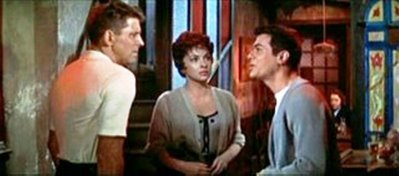
No film makes a better case for this that his 1956 effort Trapeze starring Burt Lancaster, Tony Curtis and Gina Lollobrigida. This triangle set amidst the soaring artists of a circus surpasses hokey and comes perilously close to being plain awful. Lancaster plays a former trapeze star, reduced to being a rigger after an injury, who finds life in his work again through the young prodigy Curtis. Lollobrigida threatens to come between them both personally and professionally but, let's face it — the real romance here is between Burt and Tony with nearly as much gay subtext as Curtis had with Laurence Olivier in Spartacus. As a film, it's pretty dreadful but has a good live-action film ever been made that was set in a circus?


Of course, Trapeze turns out to be a real fun ride compared to The Agony and the Ecstasy, though at least they got the first part of the title right. Come to think of it — has any really good film been made about a true-life artist either? If so, this account of Michelangelo (the ever-stiff Charlton Heston) trying to paint the Sistine Chapel for Pope Julius II (the most British pontiff of Italian lineage in the history of the papacy as played by Rex Harrison) certainly is not that film. It begins with a nearly 15-minute, dry recitation of Michelangelo's artistic works up until that point — and it's all downhill from there. A running gag in the film is Julius constantly asking Michelangelo, "When will it end?" to which the artist replies, "When it is finished?" and Lord knows I felt the same way trying to get through this snoozer of a film, despite its colorful cinematography. Of course, as history it's fairly suspect as well. Granted that it was 1965 and Heston would have never played Michelangelo as the homosexual that history seems to have concluded he was, the film does have to insert some female love interests for him, lest people watching the movie get the right idea.

Now while I don't worship Oliver! the way Josh R does nor do I hold it in the disdain that many worst picture survey participants expressed last year, this certainly wasn't a great film or the one that should have brought Reed an Oscar. It does have great performances from young Jack Wild, Oliver Reed, Shani Wallis and, most especially, Ron Moody as Fagin, and many of the musical numbers are well done, but Oliver! is way too damn long. I imagine a great deal of the hatred exhibited earlier this year had to do with Reed winning best director in 1968 over Stanley Kubrick for 2001: A Space Odyssey, but I always try to blame the Academy for Oscar's mistakes instead of the winner. For me, the greatest crime Oliver! commits is its excessive length. When little Oliver (Mark Lester) delivers the classic line, "Please sir — may I have some more" I have to believe that someone mistook his request for additional gruel with a desire for more footage and he should have been refused if that had been his wish.
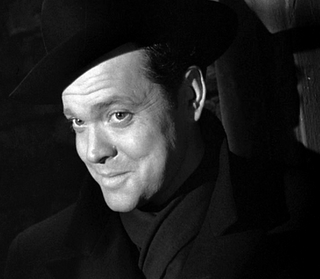
However, when you're talking about Carol Reed, all roads lead back to The Third Man in the end. Nothing else he made matters as long as it exists. It's his legacy and the most important reason he should be remembered today on what would have been his 100th birthday. Though The Third Man was released in England in 1949, it was released for Oscar consideration in 1950 — and what a year and what competition it faced. Joseph L. Mankiewicz won for the great All About Eve and Billy Wilder was nominated for directing the even better Sunset Blvd. and he had to contend with John Huston for The Asphalt Jungle as well, so Reed's direction of this masterpiece never really stood a chance, though the nominations it didn't get remain an outrage. No supporting nomination for Welles (though I'd still have voted for George Sanders' Addison De Witt). At least Robert Krasker won for his cinematography. The fact The Third Man lost editing to King Solomon's Mines is downright silly. Graham Greene's great screenplay was completely ignored. Of course, the greatest outrage is its omission from the best picture ranks when Born Yesterday, Father of the Bride and King Solomon's Mines made the cut. Then again, I think Harry Lime and the gang had the last laugh — who really wants to watch those movies again after they've seen them once? In Harry's mind, all the Swiss could take credit for is the cuckoo clock but if Reed's legacy consisted solely of The Third Man, that would be more than enough for which to be grateful.
Tweet
Labels: Bogdanovich, Carol Reed, Heston, Huston, Joseph Cotten, Kubrick, Lancaster, Mankiewicz, Mason, Olivier, Sanders, Selznick, T. Howard, Tony Curtis, Welles, Wilder
Comments:
<< Home
It's had to give Reed a fair assessment based on the films readily available. I did see The Stars Look Down in a theater in NYC around thirty years ago, while Outcasts of the Island was seen one late night on broadcast television. The last Reed film I saw was The Key on TCM - it has it's moments, but was mostly tedious going. I do find Trapeze very watchable, probably due mostly to the cast led by Lancaster.
In a way, I think Reed was a victim of his own early success. The trio of films on which his reputation and legacy are based - The Third Man, The Fallen Idol and Odd Man Out - brought him to Hollywood's attention, and took him away from the kind of material that best suited his talents. It's the oldest story on record - an enterprising auteur hits big with a non-studio or independent film, is assimilated into the commercial filmmaking establishment, and winds up making inferior films from inferior scripts. It's interesting that Bogdanovich should be one of the people to note how Reed failed to live up to the promise he'd shown in his early films - I personally think Bogdanovich is guilty of this to an much greater degree, considering the films that came after the period between 1971-73 (and What's Up Doc and Paper Moon, while fun, were not on the level of The Last Picture Show).
There is one other film Reed made that is deserving of mention - 1952's The Man Between, which while not in the same class as the three films previously mentioned, is still very much in the style at which the director most excelled. Of course, my admiration for the much-maligned Oliver! remains undiminished - it is long, to be sure, but I have never found the pacing to be a problem. Running time, in and of itself, is generally irrelevant - there are three-hour films I can watch in one sitting without once being aware of the time that has passed, whereas films half as long can sometimes feel like an eternity. Obviously, how different people react to different films is entirely subjective - but I think anyone can concede that Oliver! is a well-made film, and that Reed's win can in no way be considered a travesty (I know you weren't implying that, Copeland - but others have...)
There is one other film Reed made that is deserving of mention - 1952's The Man Between, which while not in the same class as the three films previously mentioned, is still very much in the style at which the director most excelled. Of course, my admiration for the much-maligned Oliver! remains undiminished - it is long, to be sure, but I have never found the pacing to be a problem. Running time, in and of itself, is generally irrelevant - there are three-hour films I can watch in one sitting without once being aware of the time that has passed, whereas films half as long can sometimes feel like an eternity. Obviously, how different people react to different films is entirely subjective - but I think anyone can concede that Oliver! is a well-made film, and that Reed's win can in no way be considered a travesty (I know you weren't implying that, Copeland - but others have...)
Just saw "The Third Man" for the first time the week before Christmas, and you're right on all counts. I was mesmerized by the visuals.
I didn't realise this but Carol Reed used to live actually on Kings Road in London.
So how about this for a spooky moment; earlier this year I went to see 'The Third Man' at a cinema on Kings Road and walking back toward Sloane Square tube I noticed a blue plaque stating that this was Carol Reed's home.
Happy New Year!
Post a Comment
So how about this for a spooky moment; earlier this year I went to see 'The Third Man' at a cinema on Kings Road and walking back toward Sloane Square tube I noticed a blue plaque stating that this was Carol Reed's home.
Happy New Year!
<< Home


